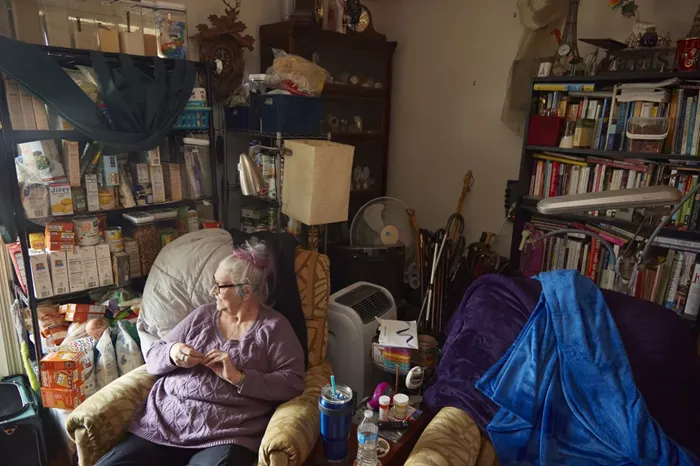Hoarding Disorder (HD) is a complex and often misunderstood mental illness characterized by the persistent difficulty in discarding possessions, regardless of their actual value. This article delves into the mental illness that causes hoarding, its symptoms, underlying causes, and treatment options, providing a comprehensive understanding of this challenging condition.
Defining Hoarding Disorder
What is Hoarding Disorder?
Hoarding Disorder is a mental health condition recognized by the American Psychiatric Association in the Diagnostic and Statistical Manual of Mental Disorders, Fifth Edition (DSM-5). Individuals with HD experience extreme distress at the thought of discarding items, leading to the accumulation of possessions that clutter living spaces and disrupt the ability to use them for their intended purposes.
Symptoms of Hoarding Disorder
The primary symptoms of Hoarding Disorder include:
Persistent Difficulty Discarding Possessions: Individuals with HD struggle to part with items, even those of little or no value.
Accumulation of Clutter: This difficulty results in excessive accumulation of items, cluttering living areas to the extent that they become unusable.
Distress and Impairment: The thought of discarding items causes significant distress, and the accumulation of clutter leads to functional impairment in daily activities, including maintaining a safe living environment.
The Mental Illness Behind Hoarding
Obsessive-Compulsive Disorder (OCD)
Hoarding Disorder was initially considered a subtype of Obsessive-Compulsive Disorder (OCD) due to the similarities in compulsive behaviors. While there is overlap, HD is now recognized as a distinct disorder. However, some individuals with hoarding behaviors also exhibit symptoms of OCD, such as intrusive thoughts and ritualistic behaviors.
Anxiety Disorders
Anxiety is a significant component of Hoarding Disorder. The anxiety associated with discarding items and the fear of needing them in the future can drive hoarding behaviors. The clutter can also serve as a coping mechanism for managing anxiety and providing a sense of security.
Depression
Depression is commonly comorbid with Hoarding Disorder. Feelings of sadness, hopelessness, and low energy can exacerbate hoarding behaviors. Individuals may accumulate items as a way to fill a void or combat feelings of worthlessness.
Attention-Deficit/Hyperactivity Disorder (ADHD)
There is a notable association between Hoarding Disorder and ADHD. The executive functioning deficits in ADHD, such as poor organization and difficulty with decision-making, can contribute to the inability to manage possessions effectively. The impulsivity seen in ADHD can also lead to the accumulation of items.
Trauma and Stress-Related Disorders
Traumatic experiences and chronic stress can trigger or worsen hoarding behaviors. Individuals may hoard as a way to cope with trauma or as a means of creating a sense of control and safety in their environment. Hoarding can be a protective response to past experiences of loss or deprivation.
Causes and Risk Factors of Hoarding Disorder
Genetic Factors
Research indicates that there is a genetic component to Hoarding Disorder. Studies have shown that individuals with a family history of hoarding are more likely to develop the disorder themselves. This genetic predisposition suggests that hoarding behaviors may be inherited.
Brain Structure and Function
Neuroimaging studies have identified abnormalities in the brain structure and function of individuals with Hoarding Disorder. Areas of the brain involved in decision-making, emotional regulation, and cognitive processing show differences in those with HD. These differences may contribute to the difficulties in discarding items and managing clutter.
Environmental Factors
Environmental factors, such as upbringing and life experiences, can also play a role in the development of Hoarding Disorder. Childhood experiences of deprivation or instability, such as poverty or frequent moves, can lead to hoarding behaviors as a way to create a sense of security and stability.
Personality Traits
Certain personality traits, such as perfectionism, indecisiveness, and a strong sense of responsibility for possessions, are commonly observed in individuals with Hoarding Disorder. These traits can contribute to the difficulty in discarding items and the tendency to accumulate clutter.
Consequences of Hoarding Disorder
Physical Health Risks
Hoarding Disorder can pose significant physical health risks. The accumulation of clutter can create unsanitary living conditions, leading to health hazards such as mold growth, pest infestations, and increased risk of falls and injuries. Additionally, clutter can obstruct access to essential areas, such as kitchens and bathrooms, impacting daily living and hygiene.
Mental Health Implications
The mental health implications of Hoarding Disorder are profound. The disorder can exacerbate feelings of anxiety, depression, and shame. The social isolation that often accompanies hoarding behaviors can further impact mental well-being, leading to a cycle of worsening symptoms and increased hoarding.
Social and Occupational Impairment
Hoarding Disorder can significantly impair social and occupational functioning. Individuals with HD may avoid inviting others into their homes due to embarrassment or fear of judgment. This isolation can strain relationships with family and friends. Additionally, hoarding behaviors can interfere with work responsibilities and productivity.
Financial Consequences
The financial consequences of Hoarding Disorder can be severe. Individuals may spend excessive amounts of money on items they do not need, leading to financial strain. The cost of cleaning, organizing, and potentially relocating due to uninhabitable living conditions can also be substantial.
Diagnosis and Treatment of Hoarding Disorder
Diagnosis
Diagnosing Hoarding Disorder involves a comprehensive evaluation by a mental health professional. This includes a detailed assessment of symptoms, medical history, and the impact of hoarding behaviors on daily life. The DSM-5 criteria for Hoarding Disorder include persistent difficulty discarding possessions, resulting in clutter that disrupts living spaces and causes significant distress or impairment.
Cognitive-Behavioral Therapy (CBT)
Cognitive-Behavioral Therapy (CBT) is the most effective treatment for Hoarding Disorder. CBT focuses on identifying and challenging the thoughts and behaviors that contribute to hoarding. Techniques such as exposure therapy, cognitive restructuring, and skills training are used to help individuals develop healthier habits and reduce clutter.
Medication
While no medications are specifically approved for Hoarding Disorder, certain medications can help manage symptoms, especially when comorbid conditions like depression or anxiety are present. Selective serotonin reuptake inhibitors (SSRIs) are commonly prescribed to alleviate these symptoms and improve overall functioning.
Support Groups and Peer Support
Support groups and peer support can provide valuable assistance for individuals with Hoarding Disorder. Connecting with others who share similar experiences can reduce feelings of isolation and provide practical strategies for managing hoarding behaviors. Support groups can also offer encouragement and accountability during the decluttering process.
Conclusion
Hoarding Disorder is a complex mental health condition with significant consequences for individuals and their families. Understanding the mental illness behind hoarding, recognizing its symptoms, and seeking appropriate treatment are crucial steps in managing the disorder. With the right support and interventions, individuals with Hoarding Disorder can achieve improved functioning and quality of life, creating safer and more organized living environments.
[inline_related_posts title=”You Might Be Interested In” title_align=”left” style=”list” number=”6″ align=”none” ids=”9229,9222,9226″ by=”categories” orderby=”rand” order=”DESC” hide_thumb=”no” thumb_right=”no” views=”no” date=”yes” grid_columns=”2″ post_type=”” tax=””]
































